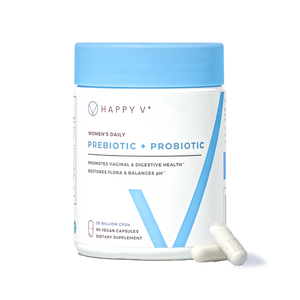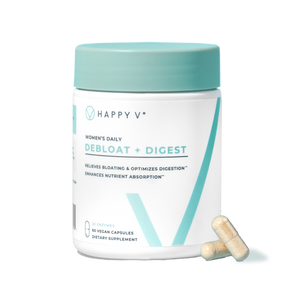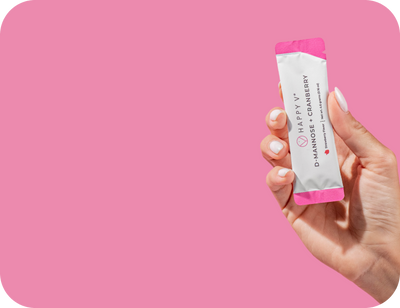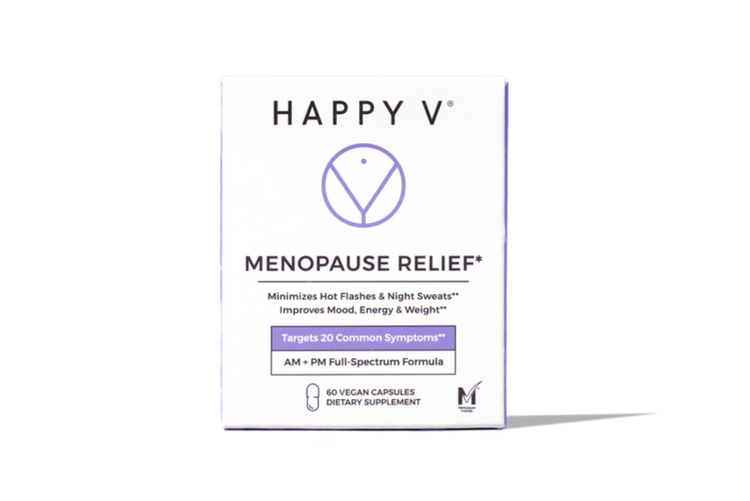- Fact Checked
- September 19, 2025
- 19 min read
What Are the 34 Symptoms of Perimenopause? Breaking Down the Signs and Solutions
Table of Contents
Table of Contents
Perimenopause is one of life's most significant transitions, yet many people enter it feeling unprepared and uninformed. Understanding the full scope of potential symptoms (all 34 of them!) empowers you to recognize what's happening in your body and take proactive steps toward relief.
While the list might seem overwhelming at first, remember that knowledge is power, and there are numerous effective ways to manage symptoms and thrive during this natural life stage. This comprehensive guide will walk you through everything you need to know about perimenopause symptoms and how to find the support you deserve.
This post is for informational purposes only and does not constitute medical advice. See full disclaimer below.
What Is Perimenopause?
Perimenopause, literally meaning "around menopause,"1 is the transitional period leading up to menopause when your ovaries gradually begin producing less estrogen. This phase marks the beginning of your reproductive system's natural wind-down process. Unlike menopause itself, which is defined as 12 consecutive months without a menstrual period2, perimenopause is characterized by irregular hormone fluctuations that can cause a wide range of symptoms3.
During perimenopause, your estrogen and progesterone levels don't decline steadily, but fluctuate unpredictably, sometimes spiking higher than normal before dropping significantly. These hormonal roller coasters are responsible for the diverse array of symptoms you might experience.
How Long Does Perimenopause Last and What Are the Stages?
Perimenopause duration varies dramatically from person to person. Some experience symptoms for as little as four years4, while others may navigate this transition for up to 10 years or more. The average duration is typically 4-6 years, but there's no universal timeline.
Perimenopause generally progresses through two stages:
Early Perimenopause: Your periods may still be relatively regular, but you might notice subtle changes in cycle length or flow. Hormone levels begin fluctuating, and some symptoms may start appearing.
Late Perimenopause: Periods become more irregular, with cycles varying by seven days or more. You might skip periods entirely for months at a time. Hormone fluctuations intensify, and symptoms often become more noticeable.
The transition officially ends when you reach menopause, defined as 12 consecutive months without a menstrual period5.
Why Do Perimenopause Symptoms Happen?
The symptoms of perimenopause stem from your body's changing hormone levels, particularly fluctuations in estrogen and progesterone. These hormones don't just affect your reproductive system. They actually have receptors throughout your entire body, including your brain, bones, cardiovascular system, skin, and more.
As hormone levels fluctuate unpredictably during perimenopause, the various systems in your body that rely on hormonal stability can be affected6. Estrogen, for instance, helps regulate neurotransmitters in your brain that affect mood, sleep, and cognitive function7. It also plays roles in temperature regulation, bone density, and cardiovascular health.
The unpredictable nature of these hormonal changes is what makes perimenopause symptoms so varied and sometimes intense. Your body is essentially recalibrating to function with different hormone levels, and this adjustment period creates the constellation of symptoms many people experience.
The 34 Symptoms of Perimenopause
Here are the most common symptoms women experience during menopause. When it comes to prevalence, “Very Common” means it affects the majority of women, “Common” means it affects 30-60% of women, “Moderate/Less common” affects 10–30% of women, and “Rare” means under 10% of women. This is all according the latest data we have about perimenopause.
| Category | Symptom | Prevalence |
| Mood & Cognitive | Mood swings | Very common |
| Irritability | Very common | |
| Difficulty concentrating | Common | |
| Brain fog | Common | |
| Anxiety | Common | |
| Depression | Moderate | |
| Insomnia | Very common | |
| Decreased libido | Common | |
| Vasomotor | Hot flashes | Very common |
| Night sweats | Very common | |
| Hormonal & Menstrual | Irregular periods | Very common |
| Breast tenderness | Common | |
| Physical | Headaches | Common |
| Weight gain | Very common | |
| Joint pain | Common | |
| Muscle tension | Moderate | |
| Dizziness | Moderate | |
| Body odor changes | Moderate | |
| Hair loss / thinning | Common | |
| Brittle nails | Less common | |
| Itchy skin | Common | |
| Digestive & Appetite | Bloating | Common |
| Digestive problems | Common | |
| Changes in taste | Less common | |
| Food cravings | Common | |
| Less Common / Unusual | Burning mouth | Less common |
| Tinnitus | Less common | |
| Bleeding gums | Less common | |
| Tingling extremities | Less common | |
| Electric shocks | Rare | |
| Cardiovascular / Metabolic | Heart palpitations | Moderate |
| Sexual & Genitourinary | Vaginal/vulval dryness | Very common |
| Painful intercourse | Common | |
| Changes in sexual sensation | Moderate | |
| Urinary symptoms | Common | |
| Increased infection risk (UTIs, BV, yeast) | Common | |
| Sleep & Energy | Fatigue | Very common |
Why 34 Symptoms?
You may see the phrase “34 symptoms of perimenopause” widely referenced online and in women’s health literature. This framework has become a popular shorthand for the most commonly reported experiences, even though the exact number can vary depending on the source. It’s a useful tool to validate your own symptoms, but it’s not exhaustive. Some people may experience more, fewer, or different symptoms. Every journey is unique.
Understanding the full range of potential perimenopause symptoms can help you recognize patterns in your own experience and communicate more effectively with healthcare providers. These symptoms fall into three main categories, each affecting different body systems as hormones fluctuate:
The 34 Symptoms In Detail
As we dive into each of these symptoms, you’ll notice we don’t just cover the physical impact, but also the emotional and social ripple effects they can create. That’s because perimenopause doesn’t happen in isolation. It touches nearly every part of daily life, from your relationships and career to your confidence and sense of self.
By exploring how each symptom shows up in the body, why it happens hormonally, and how it can affect your mental and emotional well-being, we want to make sure you have the full picture. That way, you’re not left wondering if what you’re feeling is “normal” or why it’s happening. Instead, you’ll gain validation, clarity, and practical insights to help you navigate this transition with compassion for yourself and stronger tools for relief.
Mood and Cognitive Changes
The brain contains numerous estrogen receptors, making neurological and emotional symptoms particularly common during perimenopause. As estrogen levels fluctuate, neurotransmitters that regulate mood and cognitive function can be significantly impacted. Poor sleep from night sweats and other physical symptoms can worsen these effects, creating a cycle where symptoms reinforce each other.
-
Changes in mood - Sudden mood shifts, feeling angry, weepy or sad for no apparent reason, or becoming easily irritated by minor daily frustrations. These mood swings can strain relationships and affect work performance, making you feel unlike your usual self.
-
Irritability - Snapping at loved ones over small issues, feeling impatient in situations that wouldn't normally bother you, or experiencing restlessness that makes it hard to relax or enjoy activities.
-
Difficulty concentrating - Struggling to focus during meetings, forgetting what you were saying mid-sentence, or finding it impossible to multitask as efficiently as before. This can impact work performance and decrease confidence.
-
Brain fog - Memory lapses like forgetting familiar names, losing your train of thought, or feeling mentally sluggish. Many describe it as thinking through cotton, which can be frustrating but is often temporary.
-
Anxiety - Excessive worry about everyday situations, physical symptoms like rapid heartbeat or sweating, or generalized feelings of unease that may escalate to panic disorder in some cases8.
-
Depression - While mood fluctuations are normal, persistent low mood, loss of interest in activities you once enjoyed, feelings of hopelessness, or thoughts of self-harm warrant professional attention9. This goes beyond typical hormonal mood changes.
-
Insomnia - Sleep disturbances from hormonal changes, night sweats, or racing thoughts that worsen other symptoms the next day, creating a cycle of fatigue and emotional vulnerability.
- Decreased libido - Reduced interest in sexual activity due to hormonal changes, physical discomfort, or mood symptoms affecting intimate relationships10.
Emotional Impact: These symptoms can feel especially destabilizing because they affect your sense of identity and confidence. Struggling to concentrate at work, feeling unlike yourself emotionally, or experiencing brain fog can undermine self-trust and lead to frustration in relationships. Many people describe feeling like they’ve “lost control” of their personality, which can heighten anxiety and reduce self-esteem.
Remember that while these symptoms are common during perimenopause, they often improve as hormones stabilize. That being said, if mood symptoms significantly interfere with daily life or include thoughts of self-harm, professional support can make a meaningful difference.
Menopause Relief AM + PM
Supports mood, energy and weight. Minimizes hot flashes and night sweats.
Vasomotor Symptoms (Temperature Regulation Issues)
These symptoms result from hormonal fluctuations affecting the hypothalamus, your body's internal thermostat. As estrogen levels become unpredictable, your brain's temperature regulation center can misinterpret normal body temperature as overheating, triggering cooling responses.
-
Night sweats - Intense sweating during sleep that may disrupt restful sleep and cause early morning awakenings11
- Hot flashes - Sudden feelings of heat, often accompanied by sweating and flushing, affecting body temperature regulation12
Emotional Impact: Hot flashes and night sweats don’t just disrupt sleep; they can create embarrassment in public, social withdrawal, and self-consciousness about appearing sweaty or flushed. Over time, the unpredictability of these episodes may fuel anxiety and avoidance of social settings, creating a ripple effect on confidence and lifestyle.
Hormonal and Menstrual Changes
These changes occur as your ovaries gradually reduce hormone production13. The delicate balance between estrogen and progesterone becomes disrupted, with progesterone often declining first, leading to estrogen dominance and unpredictable cycles.
-
Irregular periods - Changes in cycle length, flow, or timing due to anovulatory cycles and changing ovarian function14
- Breast tenderness - Increased sensitivity or soreness in breast tissue related to hormonal fluctuations
Emotional Impact: Unpredictable periods and breast tenderness can trigger worry, inconvenience, and frustration. Irregular bleeding may raise concerns about health or fertility, while physical discomfort can interfere with intimacy and body confidence. The lack of predictability often adds a sense of loss of control, which can affect emotional well-being.
Physical Changes and Discomforts
Estrogen receptors throughout your body mean that hormonal changes affect multiple systems simultaneously. Declining estrogen impacts everything from collagen production to muscle maintenance and inflammatory responses.
-
Headaches - More frequent or severe headaches than previously experienced15
-
Weight gain - Particularly abdominal fat and visceral fat accumulation, despite no changes in diet or exercise16
-
Joint pain - Aches and stiffness in joints, back pain, and muscle aches, particularly noticeable in the morning17
-
Muscle tension - Increased tightness or soreness in muscles, plus decreased muscle strength/mass (sarcopenia)
-
Dizziness - Feeling lightheaded or unsteady
-
Body odor - Changes in natural scent or increased perspiration
-
Hair loss - Thinning hair, increased hair shedding, or increased facial hair
-
Brittle nails - Nails that break, chip, or split more easily
- Itchy skin - Increased skin dryness, dry skin, and itching
Emotional Impact: Weight gain, joint pain, headaches, and skin/hair changes can all impact body image and self-worth. Feeling uncomfortable in your body, whether through pain, fatigue, or appearance changes, can lead to decreased confidence and reluctance to engage socially or romantically. For many, these changes feel like visible reminders of aging, which can bring emotional grief.
Digestive and Appetite Changes
Hormonal fluctuations during perimenopause can disrupt the digestive system in multiple ways. Estrogen and progesterone affect gut motility, stomach acid production, and even gut flora balance, potentially leading to new food sensitivities or digestive symptoms you've never experienced before.
-
Bloating - Abdominal distension, feeling of fullness, or stomach bloating that may worsen throughout the day, often accompanied by abdominal cramps or discomfort
- Digestive problems - A range of gastrointestinal issues including indigestion, nausea, constipation, diarrhea, or excessive flatulence as your digestive system adjusts to hormonal changes
- Changes in taste - Altered taste perception affecting your taste buds, metallic taste in mouth, or suddenly disliking foods you previously enjoyed
- Food cravings - Hormonally driven cravings, particularly for sugary or carbohydrate-rich foods, along with changes in appetite that may contribute to weight gain or eating pattern disruptions
Emotional Impact: Unpredictable bloating, nausea, or appetite swings can affect self-esteem, making people feel uncomfortable in their own bodies. Cravings and weight changes may spark guilt or shame, particularly in a culture that stigmatizes women’s bodies. Social activities often center around food, so digestive unpredictability can lead to avoidance, embarrassment, or anxiety about eating with others. Over time, these changes may erode confidence and diminish enjoyment of everyday experiences.
Cardiovascular and Metabolic Effects
Estrogen plays a protective role in cardiovascular health and metabolic function18. As levels decline, your body may experience changes in heart rhythm, insulin sensitivity, and bone density.
- Heart palpitations - Awareness of irregular heartbeat, rapid, or pounding heartbeat that may indicate cardiovascular changes
Emotional Impact: Heart palpitations and metabolic changes may spark health-related anxiety, especially fears of heart disease. The sensation of palpitations can be distressing in the moment, creating panic and sleep disruption. Concerns about long-term cardiovascular health may also increase worry, particularly for those with family history.
Sexual and Genitourinary Symptoms
Declining estrogen directly affects the tissues of the vagina, vulva, and urinary tract, causing them to become thinner, less elastic, and more vulnerable to irritation and infection19. These changes also alter the natural bacterial flora of intimate areas, increasing infection risk. The interconnected nature of these symptoms means one can impact another. For example, vaginal dryness causing painful sex, which then decreases libido, or urinary symptoms affecting sleep and confidence.
-
Decreased libido - Reduced interest in sexual activity due to direct hormonal effects on arousal and pleasure, plus secondary effects from other symptoms like low mood, fatigue, or physical discomfort during intimacy
-
Vaginal and vulval dryness - Reduced natural lubrication affecting both the vagina and vulva, vaginal atrophy (thinning of vaginal walls), vaginal irritation, itching, or burning sensations that can make everyday activities uncomfortable
-
Painful intercourse (dyspareunia) - Discomfort, burning, or pain during sex due to tissue changes, which can create anxiety around intimacy and further impact sexual desire and relationships
-
Changes in sexual sensation - Altered sensation, reduced pleasure, or difficulty achieving orgasm due to decreased blood flow and nerve sensitivity in genital tissues
-
Urinary symptoms - Including urinary urgency (sudden, strong need to urinate), frequency (needing to urinate more often), stress incontinence (leaking with coughing, sneezing, or exercise), overactive bladder symptoms, or painful urination
- Increased infection risk - Higher susceptibility to urinary tract infections (UTIs), bacterial vaginosis, and yeast infections due to tissue fragility, altered pH levels, and changes in natural bacterial flora. Recurrent infections may become a frustrating pattern.
Emotional Impact: Vaginal dryness, painful intercourse, or urinary changes often impact self-esteem, relationships, and intimacy. These symptoms may create embarrassment, avoidance of sexual activity, or fear of rejection. Many people internalize these changes as a personal failing, when in reality they are medical and hormonal. Left unaddressed, they can strain relationships and erode body confidence.
Important Note: While these symptoms are common during perimenopause, sudden changes in urinary habits, persistent pain, or unusual discharge should be evaluated by a healthcare provider to rule out other conditions.
Sleep Disturbances and Fatigue
Sleep problems during perimenopause result from a perfect storm of factors: hormonal fluctuations disrupt natural sleep cycles20, while night sweats and anxiety create physical and mental barriers to rest.
- Fatigue - Persistent tiredness that may result from poor sleep quality, difficulty falling asleep, or frequent awakening21
Emotional Impact: Fatigue affects every aspect of life, including mood, work, relationships, and self-care. Sleep problems can heighten irritability and worsen other symptoms, creating a cycle of exhaustion. The inability to feel rested despite efforts can lead to hopelessness and lower resilience, making everyday stressors feel overwhelming.
Less Common or Unusual Symptoms
These symptoms occur when hormonal changes affect specialized tissues and nerve pathways throughout the body. While experienced by fewer people than hot flashes or mood changes, they're recognized by menopause experts and affect approximately 10-30% of those going through perimenopause. Most of these symptoms are temporary and tend to improve as hormone levels stabilize after menopause, though the timeline varies for each person.
-
Burning mouth sensation - Burning mouth syndrome causes feelings of burning, scalding, tingling, or numbness in the mouth, tongue, or oral mucosa. This occurs because oral tissues contain estrogen receptors that become less responsive as hormone levels decline, leading to changes in saliva production and tissue sensitivity.
-
Tinnitus - Ringing, buzzing, or other phantom sounds in the ears happen because estrogen helps maintain inner ear function and blood flow. Hormonal fluctuations can affect the delicate structures responsible for hearing and balance.
-
Bleeding gums - Increased gum sensitivity, bleeding during brushing, or tooth sensitivity result from estrogen's role in maintaining oral tissue health and immune function. Declining levels can make gums more vulnerable to inflammation.
-
Tingling extremities - Pins and needles sensations or numbness in hands, feet, arms, or legs occur when hormonal changes affect nerve sensitivity and circulation. This can sometimes be related to formication (feeling like insects are crawling on your skin).
- Electric shocks - Brief, sharp sensations that feel like electrical jolts happen when fluctuating hormones affect the nervous system's electrical activity, particularly nerve conduction.
Important Note: These symptoms can overlap with other medical conditions like thyroid disorders, vitamin deficiencies, or autoimmune issues. It's wise to consult a healthcare provider to rule out other causes before attributing them solely to perimenopause.
Tracking Your Symptoms
Tracking your perimenopause symptoms helps you spot patterns, identify triggers, and communicate more effectively with your healthcare provider. Try:
-
Daily journal prompts: “How was my sleep? Mood? Energy? Pain level?”
-
Cycle mapping: Note symptoms alongside your period flow, length, or skipped cycles.
-
Symptom checklist: Use a printable or digital tracker to tick off daily experiences for 1–3 months.
- Trigger notes: Log food, alcohol, stress, or exercise to see if patterns emerge.
Finding Symptom Relief
The good news is that numerous approaches can help manage perimenopause symptoms effectively. Treatment doesn't have to be one-size-fits-all. You can (and should!) combine different strategies to create a personalized approach that works for your lifestyle and preferences.
Medical and Therapeutic Options
These treatment provide effective relief from perimenopause symptoms and should be overseen/administered by your healthcare provider.
-
Individualized Care: Working with healthcare providers who understand perimenopause can help you develop a personalized treatment plan that addresses your specific symptom profile.
-
Cognitive-Behavioral Therapy (CBT): This type of therapy can be particularly effective for managing mood changes, anxiety, depression, and panic disorder during perimenopause.
-
Selective Serotonin Reuptake Inhibitors (SSRIs): These medications can help with mood symptoms and may also reduce vasomotor symptoms like hot flashes in some people.
-
Hormone Replacement Therapy (HRT): Also known as menopausal hormone therapy, HRT can be highly effective for managing multiple symptoms by supplementing declining hormone levels and addressing the root cause of many perimenopausal symptoms.
- Menopause Clinics: Specialized clinics offer comprehensive care and expertise in managing the full spectrum of perimenopausal symptoms.
Lifestyle Modifications
A healthy lifestyle is more important than ever, especially:
-
Regular Movement and Nutritious Diet: Physical activity and balanced nutrition can help mitigate mood and cognitive changes, physical discomforts, and metabolic effects. Exercise helps regulate mood, improve sleep quality, maintain bone density to prevent osteoporosis, and manage weight gain. A diet rich in whole foods, healthy fats, and adequate protein supports overall hormonal health and can help with digestive issues.
-
Sleep Hygiene: Establishing a regular sleep schedule, creating an optimal sleep environment, and practicing good sleep hygiene can help combat insomnia and improve restful sleep quality.
-
Alcohol Awareness: Limiting alcohol intake can specifically improve night sweats, sleep disturbances, anxiety, and weight management. Alcohol can trigger hot flashes and disrupt sleep quality.
- Stress Reduction Support: Meditation, deep breathing exercises, mind-body techniques, and even hypnosis can reduce stress levels and decrease symptom severity. Regular stress management practices help your body cope better with hormonal fluctuations.
Natural and Complementary Approaches
Looking for alternatives to traditional medical treatments? Popular relief strategies include:
-
Acupuncture: This traditional practice may help with various symptoms, including hot flashes, mood changes, and sleep disturbances.
-
Support Groups: Connecting with others going through similar experiences can provide emotional support and practical tips for managing symptoms.
- Herbal Supplements: Some people find relief with herbal supplements like black cohosh, Norway spruce evening primrose oil, and flower pollen extract, though it's important to discuss these with your healthcare provider.
One supplement to make sure to discuss with your provider is Happy V’s Menopause Relief AM + PM. It contains ingredients that clinical studies have shown lead to an 88% reduction in hot flash severity, 62.6% reduction in night sweats, and more. Plus, it’s AM + PM, dual pill design means you are protected from symptoms around the clock, morning, noon and night.
The Power of Mindset
Research shows that maintaining a positive attitude and approaching perimenopause with curiosity rather than dread can actually help reduce symptom severity. While this is admittedly easier said than done, reframing this transition as a natural evolution rather than something to endure can make a meaningful difference in your experience.
When to See a Doctor
Never suffer through symptoms in silence. Consider meeting with a healthcare provider if:
- Symptoms significantly interfere with your daily life, work, or relationships
- You experience severe mood changes, including thoughts of self-harm
- You have concerns about irregular bleeding patterns
- Physical symptoms like heart palpitations or severe headaches are concerning you
- You're interested in exploring treatment options like hormone therapy
- You want to discuss preventive health measures for the post-menopausal years
Remember, you are the sole judge of how your symptoms affect your quality of life. Don't let anyone minimize your experience or tell you that discomfort is simply something you have to endure. Every person deserves access to information about their options and support in making informed decisions about their health.
Final Thoughts
Armed with knowledge about what to expect when it comes to symptoms and potential relief strategies, you can navigate this perimenopause journey with confidence. Whether you choose lifestyle modifications, medical treatments, natural remedies, or a combination of approaches, the key is finding what works best for your unique situation.
Remember that perimenopause is temporary—this too shall pass. With the right support, information, and care, you can not only manage symptoms effectively but potentially emerge from this transition feeling more empowered and in tune with your body than ever before.
Keep the Conversation Going
-
Visit our blog for more women’s health tips.
-
Join our private Happy V Facebook group to hear from others who’ve been there.
- Explore supplements designed to support your vaginal health journey.
Disclaimer: This blog is for informational and educational purposes only and is not intended to diagnose, treat, cure, or prevent any disease. Statements about supplements have not been evaluated by the Food and Drug Administration. For more information about vaginal infections, visit the CDC or speak to a licensed healthcare provider.













